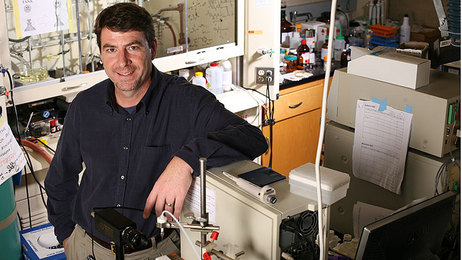« Innovation in Business Story
A Mussel-Inspired Glue to Repair Fetal Membranes
Breakthrough:A medical glue inspired by the sticking power of mussels that could be used for fetal surgery, wound repair and dentistry.
Business:
Nerites Corporation/Northwestern University, United States
The Story:
 Taking their inspiration from nature a team of scientists from Northwestern University in the United States are developing a sealant that could be used to repair defects in human fetal membranes. The insight comes from studying the sticking power of mussels. There are very few surfaces that these marine mollusks are not capable of adhering to.
Taking their inspiration from nature a team of scientists from Northwestern University in the United States are developing a sealant that could be used to repair defects in human fetal membranes. The insight comes from studying the sticking power of mussels. There are very few surfaces that these marine mollusks are not capable of adhering to.The fetal membrane is the structure that surrounds the developing fetus. Small ruptures or tears can sometimes occur which results in the leakage of amniotic fluid. This can lead to premature labor or termination of the pregnancy. Some of these ruptures will spontaneously repair themselves, but currently no method exists for doctors to be able to intervene and repair those that don’t.
While there are a lot of strong glues in the world they are not compatible with the human body, nor are they safe to use medically.
Mussel Power
Nature is a wonderful bioengineer. Mussels secrete adhesive plaques via a foot that allows them to stick to wet slimy surfaces. It is a survival mechanism. If the aquatic animals are not able to stay firmly attached to a surface they can easily be thrown around by currents and smashed against rocks.
The scientists have been trying to understand the mechanical and chemical properties of the adhesive plaques to create a synthetic bio-inspired glue to help repair human tissue. Their aim was to come up with a sealant that could work in both wet and dry conditions. Surgeons and medical personnel often work in wet conditions and an adhesive that would be of use to them would be one that works quickly in these situations. Mussels attach themselves to surfaces in wet salty environments and in effect our bodies are wet salty environments too.
Tissue Tests
The researchers have tested their mussel-inspired sealant on human fetal tissue with astonishing results. They punched holes three millimeters wide in fetal tissue in a test tube. Then they applied their sealant as well as other candidates such as medical super glues. The mussel-inspired glue was by far the strongest and also had the best toxicity results.
“We tested our mussel-inspired sealant on living fetal tissue and found it was both biocompatible and effective at sealing the tiny holes—two features essential in such a material," commented Phillip B. Messersmith, professor of biomedical engineering at Northwestern's McCormick School of Engineering and Applied Science.
Super Sealant
The sticky stuff is an injectable sealant consisting of two solutions that when combined form a seal in 10 to 20 seconds. One solution is a catalyst and the other a synthetic polymer containing DOPA, an integral amino acid that is found in proteins that are vital to a mussel’s ability to stick to wet surfaces. Chemical analysis of the mussel glue had previously revealed high concentrations of DOPA.
There are so many potential applications for the fruits of this cutting edge research from dentistry (for example to affix a crown or filings) to the closure of wounds after injury. The sealant could also be used to seal leaks in the body and to attach medical devices.
The university research group is working with Nerites Corporation, a medical devices company in Madison, Wisconsin, to develop the mussel-inspired glues for medical use. The next stage will be to conduct experiments in animal models.
Next Story »
IdeaConnection: What Can we Solve for You?

